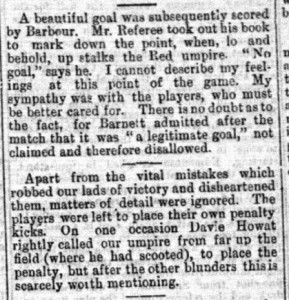By Mark Andrews
We at the AHS have always championed John Wilkinson Humble because he was associated with the club from the start of the 2nd season as a player in 1887 until leaving in a Norris inspired cloud in 1927. 40 years at a club as player, committeeman, director and supporter is very impressive. However, one role he did not excel at was the role of home side Royal Arsenal umpire, which was distinctly short lived.
In those days there was a referee who was assisted by umpires. The referee was usually neutral but both teams provided one umpire to effectively act as a conduit between the players and the referee and “it is only through the umpire that appeals of the players can reach the referee”
When Royal Arsenal moved to the Invicta in 1890 they tried a rolling system of six different men. One of these men was Jack Humble and he alone of the umpires came in for adverse comment.
He is first mentioned as the Red umpire against 93rd Highlanders on 11 Oct 1890 in the South Eastern Herald when he is mildly rebuked with the words “time after time did the players appeal against the offside play of the Scots, and the fouls, but Mr Humble either seemed too modest or else too interested in the game to appeal for them.”
However, his second and from what we can see final appearance as a Red umpire was away at Clapton on 15 November 1890 and what has to be the first time in any report a team’s umpire is given as the main reason the team lost, so central was he and his poor decisions to the Arsenal defeat of 1-2.
Firstly, he was blamed for not overturning the referee when he accepted, the referees offside decision, of what the reporter Invicta claims was clearly an onside goal scored by Howat. This is explained thus “The Reds should have had an umpire who could put the matter before the referee, so that he couldn’t possibly have given an adverse decision. In the absence of such an umpire, goal number one was lost”.
Worse was to follow as Barbour scored a backheeled goal, of which the referee accepted and was about to write down in his book, when he was stopped in his tracks by the Red Umpire who exclaimed “no goal”. Despite the neutral referee believing it was a legitimate goal Humble, the Arsenal umpire, persuaded him to disallow an Arsenal goal.

The reporter continues during that week and next to excoriate Humble, referring to the Clapton game as the “Humble match” and indeed so bad were his performances that his bizarre judgements were questioned in a specific question about his umpiring 10 weeks later at the half Year AGM of 1891 .
The next week he was replaced by Alf Singleton, by most accounts a far superior umpire.
However, Singleton was part of the Weaver clique aiming to take over control of the Royal Arsenal football club which was in full swing by this time. He eventually ended up setting up the ROFFC in direct competition to Royal Arsenal FC but which folded soon after and he moved back to his home town of Preston.
Clint Eastwood once said a man should know his limitations, Singleton obviously did not, but by 1891 Humble did, as he concentrated from then on to become a leading adminstrator for the club and the third longest serving board member in Arsenal history.
The story of Weaver’s Clique will continue in our next Book on Royal Arsenal 1886 -1893, as we find more and more details of this episode and it appears it began earlier than we originally believed. For those who haven’t already purchased it Woolwich Arsenal: The club that changed football has a whole chapter on the events that led to the club being renamed Woolwich Arsenal, which was in many ways a necessity due to Weaver and his cronies assault.



Mark,
In the Woolwich Arsenal book you seemed to say the first time the Weaver clique was seen was mid 1892 but that you suspected it was earlier. Do you have any firmer dates from the further research?
Andrew
@ Andrew,
Thanks for your insightful comment.
The question we are asking ourselves as we delve into the papers is:
Was Weaver planning to take the club over from January 1890, and had he already made a plan with RAFC committeemen Alf Singleton and W Davis. Or did they form the clique once RAFC were at Invicta. Certainly by the Limited Liability discussion in May 1891 it was obvious from the Woolwich Gazette, and WB Jackson and Humble’s opposition that the Weaver clique were intent on a takeover.
Weaver owned the Green Man and the club started using this pub in January 1890 which suggests he made moves on the club as early as then. He then started to build the ground in March 1890. The other time he is seen at a RAFC event prior to them using the Invicta was in May 1890 at the Annual Dinner.
It’s all very tentative at present but will be honed by the time we start writing.
I am just reading through all the 1892 Woolwich Gazettes and Humble did try his hand umpiring again (or linesman as that role had been redesignated in 1891) against Sunderland on 14 November 1892.
He had sadly not improved as this sentence suggests “Mr. Humble’s decisions were certainly wrong, though probably given in good faith”. When the Sunderland player Wilson showed outright dissent, it was stated that he was wrong to show the dissent, but was right in his interpreation of the awfulness of Humble’s decision making.
Again this is the only time in this paper that any Arsenal official was specifically noted as being not up to match adjudication and the only time I have come across Humble running the line, since his last attempt in 1890.